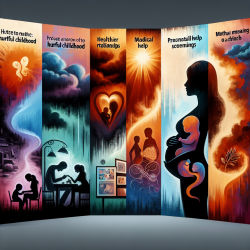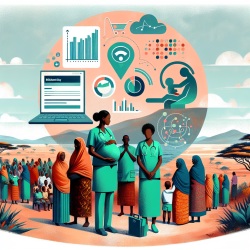Introduction
Adverse Childhood Experiences (ACEs) have long been recognized as significant predictors of poor health outcomes across the lifespan. Recent research highlights the critical impact of ACEs on maternal behaviors during pregnancy, particularly concerning substance use. This blog delves into the findings of a pivotal study titled "The Effect of Maternal Adverse Childhood Experiences (ACEs) on Substance Use During Pregnancy," and discusses how practitioners can leverage these insights to improve maternal and neonatal health outcomes.
The Link Between ACEs and Substance Use in Pregnancy
The study examined the prevalence of ACEs among mothers referred to a hospital's child protection team (CPT) due to suspected substance exposure in their newborns. The researchers found that a significant proportion of these mothers had experienced four or more ACEs (50.9%), compared to 15.2% in the general population. This high prevalence underscores the strong association between ACEs and prenatal substance use.
Key findings from the study include:
- Mothers with four or more ACEs had significantly higher odds of using cannabinoids during pregnancy.
- Household challenges, particularly parental separation or divorce, were significantly associated with substance use during pregnancy.
- Routine prenatal ACEs screening and universal, nonpunitive toxicology testing can provide opportunities for early intervention, reducing the transgenerational impact of ACEs.
Implications for Practice
Understanding the relationship between ACEs and substance use in pregnancy is crucial for practitioners aiming to support at-risk mothers. Here are some actionable steps practitioners can take:
- Implement Routine ACEs Screening: Incorporating ACEs questionnaires into prenatal care can help identify mothers at risk of substance use, enabling timely intervention.
- Provide Trauma-Informed Care: Recognizing the role of childhood adversity in shaping health behaviors allows practitioners to offer empathetic, supportive care tailored to the needs of each mother.
- Facilitate Access to Resources: Connecting mothers with substance use disorder (SUD) treatment, mental health services, and social support can mitigate the impact of ACEs and improve outcomes for both mothers and their infants.
Encouraging Further Research
While this study provides valuable insights, further research is needed to explore the nuances of ACEs and their impact on maternal and neonatal health. Practitioners are encouraged to contribute to this growing body of knowledge by:
- Participating in longitudinal studies to track outcomes of interventions targeting ACEs and substance use.
- Exploring the effectiveness of different screening tools and intervention strategies in diverse populations.
- Collaborating with multidisciplinary teams to develop comprehensive care models addressing the complex needs of mothers with high ACEs scores.
Conclusion
The study on maternal ACEs and substance use during pregnancy highlights the urgent need for routine screening and intervention strategies in prenatal care. By addressing the root causes of substance use and providing targeted support, practitioners can significantly improve outcomes for mothers and their children, breaking the cycle of adversity and fostering healthier generations.
To read the original research paper, please follow this link: The Effect of Maternal Adverse Childhood Experiences (ACEs) on Substance Use During Pregnancy.










